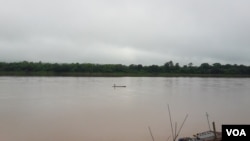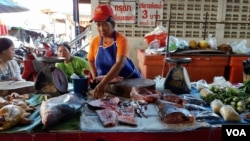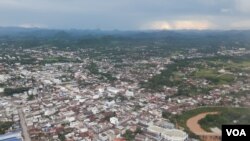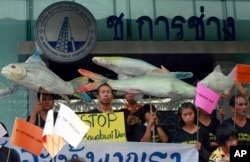Since time immemorial, the mighty Mekong River has meandered through the nations of Southeast Asia, making its way south from China's Tibetan plateau until it spills into the South China Sea, some 4,000 kilometers away.
But for the past few years, fishing communities along its banks have complained that fish stocks are drying up, and many blame construction projects underway upstream.
The iconic waterway — among the world's longest — is seeing unprecedented change. Huge hydropower dams and irrigation systems designed to power modern farms across the Mekong region are changing how people interact with the river.
Recently, Thai government officials announced a sweeping new project that would funnel tens of thousands of cubic meters of water from the Mekong to plantations and industry in the country's northeast.
The Kong-Loei-Chi-Mun project — named for tributaries the so-called "mega-diversion" scheme would draw from — is the biggest irrigation project ever undertaken in the region, and it is prompting concerns from locals, environmentalists, and some development experts.
'No one will continue this'
Like many living along Thailand's Loei River, a Mekong tributary that courses through the country's Chiang Khan region, Wachira Nantaprom has been fishing since he was a teenager. Under the new project, Wachira — also like many — could be facing resettlement.
"I am concerned that if this dam project gets constructed at this point of the Mekong River, there may be no longer a place to make a living, because we always do fishing to make a living," he told VOA's Khmer Service. "The fish will be partly gone. We already don't catch fish as much as in the past. This career may be gone from the Chiang Khan area."
Moreover, he said, an entire way of life will vanish.
"No one will continue this ... in terms of the next generation," he said. "If there's a dam, we have to change careers; we'll go to the city to be day laborers or do odd jobs."
Chhanarong Wongla, a fishing industry representative based in Loei Province, said a July project review by the Royal Irrigation Department (RID) only confirmed their fears.
"My concern is about the ecosystem, the varieties of fish and lives of people in the region," he said. "We are concerned that if there is construction here, there would be no flowing of water. It will stay still. People generally have different lifestyles based on the changes of the river. If the water is still, their lives will be entirely changed."
Decades in the making
Unveiled by Thai officials in the 1960s, Kong-Loei-Chi-Mun is one of numerous proposals to develop elaborate irrigation systems that never got off the ground.
However, a 4-year RID feasibility study that concluded in 2012 showed that construction connecting the Mekong to six smaller rivers, including the Chi and Mun, would provide water to the entire northeast and irrigate 32 million hectares of farmland. With an estimated cost of $75 billion, researchers say the 9-phase project would take some 16 years to complete.
"Project proponents claim it would increase farm incomes from an average of just under 68,000 baht [$1,947] per family per year, to 199,000 baht [$5,700], and improve the lives of 1.72 million families," wrote Hanoi-based environmental reporter Mai Lan. Her report, published by Mekong Commons, a regional development blog run by researchers and scholars, also says economic viability studies continuing through 2016 will ultimately determine whether the project will get a green light.
According the project's website, however, environmental and social impact studies conducted in 2011 showed that, if it does get off the ground, thousands would likely face resettlement.
For some, including Tanusilp Inda, a village chief in Ban Klang village, the consequences of such a large-scale project are grave.
"They don't want it to be constructed," he said of his own villagers, adding that they would "resist [the project] to their deaths."
Tek Vannara, executive director of the Phnom Penh-based NGO Forum on Cambodia, says the project would also siphon water from neighboring Mekong Basin countries that are already experiencing water shortages.
"The reduction of water would impact biodiversity … [and] agricultural practices which depend on water from the Mekong," he said, adding that more than 60 million people rely on the fish and other produce derived from the river. "Climate in the region [would] also be affected on the ground."
Echoing concerns of Wachira, the Thai fisherman, Tek explained that drastically altered water levels impact the size of fish-spawning areas, and thereby the livelihood of thousands, which ultimately transforms the distinct culture of an entire region.
Learning from the past
With more than 30 other hydropower dams currently planned for the Mekong region, even policy and development experts such as Dr. John Ward, a Laos-based natural resources research scientist at the Mekong Region Futures Institute, are beginning to sound the alarm.
Ongoing competition for short-term economic gains among Mekong Basin countries, he told VOA, has already forced long-term environmental concerns to the back burner. Documented risks from prior dam projects in the region, he said, should inform today's large-scale undertakings.
"Other countries have gone through this," he said. "They've gone from the river and unmodified system to the hardly developed one, and there are lots of lessons to learn from that.
"It's better to avoid the problems in the first place," he added. "And certainly in the U.S., in Europe, in Asia, and Australia, there are lots of examples of transboundary problems like the Mekong — and lots of lessons to be learned — [about] how to avoid future problems in the first place."
Organized talks involving all regional stakeholders, Ward added, should be held before it's too late.
Viroj Jiwaranga, the Loei provincial governor, acknowledged the impact the project would have on the region's biodiversity and cultures, but said the project would be good for the local economy and could go some way toward solving water-scarcity issues in Thailand's northeast.
Fishermen like Wachira, however, are not convinced.
This report was produced in collaboration with VOA's Khmer Service.







